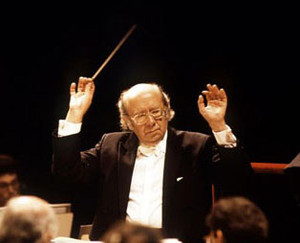Gennadi RozhdestvenskyConductorRozhdestvensky was the son of conductor Nikolai Anosov and soprano Natalya Rozhdestvenskaya. A pupil at the Gnesin School of Music and the Moscow Conservatory school for children, he entered the Conservatory in 1941 to study conducting with his father and piano with Lev Oborin. While still at the Conservatory, Rozhdestvensky conducted Tchaikovsky's Nutcracker at the Bolshoi Theater. Following his graduation in 1954, he was appointed assistant conductor at the Bolshoi and in 1956 made his first visit to England with the Bolshoi Ballet. In 1961, Rozhdestvensky was named artistic director of the Soviet Radio Symphony Orchestra, remaining there until 1974. Three years later, he became Bolshoi's youngest principal conductor, remaining at that post until 1970. During the Soviet era, Rozhdestvensky programmed music by contemporary foreign composers, most likely alienating the Soviet musical establishment; nevertheless, as chief conductor and director of the Moscow Radio Symphony Orchestra, he was allowed to lead performances of Stravinsky's Rite of Spring, Benjamin Britten's opera A Midsummer Night's Dream, as well as works by Poulenc, Hindemith, Orff, and other composers that were new to Soviet audiences. He also revived the symphonies of Sergey Prokofiev, who was regarded with suspicion in Russia, having lived in America from 1918 to 1936. Only the most eminent and respected Russian musicians were allowed extensive foreign tours, and Rozhdestvensky visited many European countries, the U.S., and Japan. He also appeared several times in Britain, mainly with the London Philharmonic Orchestra, and at Covent Garden. In 1971, he conducted the Leningrad Philharmonic Orchestra in three Promenade Concerts at London's Royal Albert Hall. The following year, Rozhdestvensky became music director of the Moscow Chamber Orchestra. Artistic director of the Stockholm Philharmonic Orchestra from 1974-77, he was principal conductor of the BBC Symphony Orchestra from 1978 to 1981. His next post was principal conductor of the Vienna Symphony Orchestra, where he stayed until 1983. In 1982, he founded, and became chief conductor of, the State Symphony Orchestra of the Ministry of Culture in Moscow. In 1987, Rozhdestvensky started teaching conducting at the Accademia Musicale Chigiana in Sienna. The Stockholm Philharmonic hired him as conductor in 1991, and three years later he was appointed chairman of the Bolshoi's artistic committee. Rozhdestvensky has maintained his reputation for adventurous programming in his many recordings and live performances. Known for his balanced and refined interpretations of Romantic and twentieth century music, he premiered numerous twentieth century works, including Denisov's Symphony for Two String Orchestras and Percussion (dedicated to Rozhdestvensky), Buzko's White Nights, Shchedrin's Carmen Suite, Prokofiev's opera The Gambler, Schnittke's Symphony No. 2 "St. Florian" and Gerhard's Don Quixote. An enthusiastic champion of contemporary composers, Rozhdestvensky has also performed works by Kancheli, Mirzoian, Organesian, and Skoryk. Rozhdestvensky's writings include Techniques of Orchestral Direction and Reflections on Music. He is married to Viktoria Postnikova, a pianist. Gennadi Rozhdestvensky was born in Moscow into a family of musicians. In 1954, he graduated from the Moscow State Tchaikovsky Conservatory (department of opera and symphony conducting, Nikolai Anosov’s class). In 1957, he completed his postgraduate studies at the Conservatory. From 1951-60 and from1978-82, he was Bolshoi Theatre conductor. From 1965-70, he was Bolshoi Theatre chief conductor. In 2000/01 season, he was Bolshoi Theatre general artistic ditector. He was music director of the following productions at the Bolshoi Theatre – the ballets: Shchedrin’s The Humpbacked Horse (1960), Tchaikovsky’s Nutcracker (1966), Bizet-Shchedrin’s Carmen-Suite (1967), Khachaturyan’s Spartacus (1968), The Knight of Sad Mien to music by R. Strauss (1985), Schnittke’s Sketches (1985); and the operas: Poulenc’s La Voix Humaine (1965), Britten’s Midsummer Night’s Dream (1965), Kholminov’s Optimistic Tragedy (1967), Rimsky-Korsakov’s Mozart and Salieri (1976), Shostakovich’s Katerina Izmailova (1980), Prokofiev’s Betrothal in a Monastery (1982), Prokofiev’s The Gambler (world premiere of the first version, 2001). In 1961 he was appointed chief conductor of the Central Radio and Television Symphony Orchestra. From 1974-85, he was music director at the Boris Pokrovsky’s Chamber Music Theatre. From 1982-92, - chief conductor of the USSR Ministry of Culture State Symphony Orchestra. From 1974-77 and from 1991-95, he was music director of the Royal Stockholm Philharmonic Orchestra. From 1978-1981, - chief conductor of the BBC Symphony Orchestra. From 1980-82, - chief conductor of the Vienna Symphony Orchestra. He worked with Berlin Philharmonic Orchestra, Royal Concertgebouw Orchestra, symphony orchestras of London, Chicago, Cleveland and others. Honorary conductor of the Yomiuri Nippon Symphony Orchestra. Performed numerous little-known works by Respighi, Handel, Mendelssohn Bartholdy, Stravinsky, Janacek, Dvorak, Mahler, Debussy, Ravel, Poulenc, Bruckner, Strauss, Berg, Schoenberg, Hindemith, Bartok, Martinu, Messiaen, Milhaud, Honegger, Orff, Britten, Zemlinsky, Roussel, Vieru and others. He has participated in world premieres of new works by Shchedrin, Slonimsky, Eshpai, Tishchenko, Kancheli, Schnittke, Gubaidulina, Denisov. He recorded all the symphonies of Haydn, Beethoven, Brahms, Sibelius, Bruckner, Mahler, Thaikovsky, Glazunov, Prokofiev and Shostakovich. Since 1974, he has been teaching at the Moscow Conservatory. Rozhdestvensky is the recipient of the Charles Cros Academy diploma (1969), of the State prize of the USSR (1970) and of the Russian Federation (1995), of the Order of Kirill and Mefody (Bulgaria, 1972), of the Order "For Merit for the Country" of IV and III degree (2001, 2007), of the Japanese Order of the Rising Sun (2002), of the French Legion of honor (2003). Honorary Member of the Royal Swedish Academy of Music (1975) and of the British Academy (1984). Since 2011 Gennadi Rozhdestvensky is chief guest conductor of the St.Petersburg Philharmonic Orchestra. © www.philharmonia.spb.ru |


